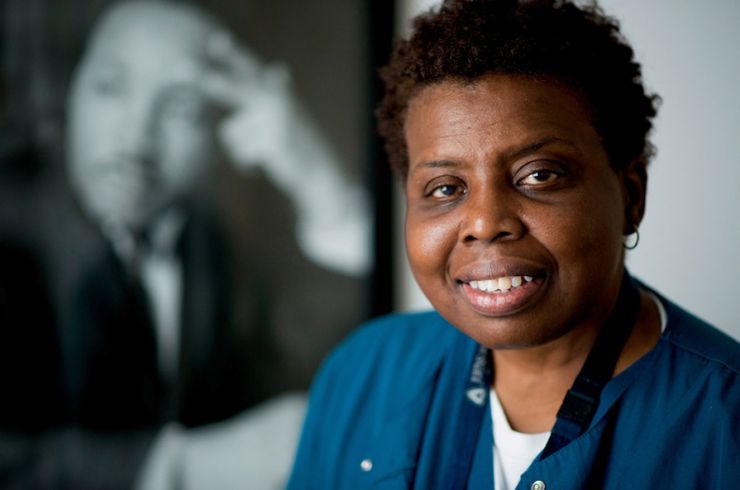The Fight For The Ballot Continues
June 13, 2016
A central tenet of our nation’s democracy is the right to vote. “It’s a civil rights issue that we’ve been fighting for a long time, says Sean McMillian, an environmental services worker at Sinai Hospital in Baltimore.
McMillian was among the 1199SEIU activists that knocked on doors during the spring primary campaign in which a host of Union-endorsed Maryland candidates swept to victory.
“This coming election is so important and that’s why we have to keep pushing,” says Renee Neal, an oxygen tech at Baltimore Johns Hopkins who took a leave to spend six weeks electioneering. Neal’s GOTV work included talking to residents about their voting rights and convincing many to register.
That is especially important in light of the strategy of extremist Republicans to suppress the turnout. They have had the help of the U.S. Supreme Court to do so. In 2013, the Court, in the case Shelby v. Holder, gutted a central provision in the historic Voting Rights Act (VRA) of 1965–the formula that determined which states and localities, because of a history of discrimination, had to seek federal “preclearance,” or approval before implementing any changes to their voting laws and procedures.
In the wake of the decision, many states rushed to enact stringent voting regulations such as eliminating same-day voter registration and pre-registration for high-school students soon to turn 18, reducing early voting and imposing strict voter ID requirements. These states also made it far more difficult and expensive to challenge discriminatory voting laws.
The voting restrictions have long been part of the extremists’ playbook. Paul Weyrich, widely regarded as one of the founding fathers of the conservative movement, famously said:
“I don’t want everybody to vote. Elections are not won by a majority of the people. They never have been from the beginning of our country and they are not now. As a matter of fact, our leverage in the elections quite candidly goes up as the voting populace goes down.”
More recently, Jim DeMint, president of the conservative Heritage Foundation, boasted, “It’s something we’re working on all over the country, because in the states where they do have voter ID laws, you’ve seen, actually, elections begin to change towards more conservative candidates.”
“We should be doing just the opposite,” says Sherel Redwood, a laundry and dietary aide at Westfield Center NH in Westfield, NJ. “Those ID requirements are terrible.”
Redwood, a delegate, is a veteran political activist who is doing volunteer election work this year. One reason she says is because she doesn’t want Donald Trump to do to the country what he’s done to Atlantic City, NJ, leaving a trail of bankruptcies. “I hope the Union calls for me to go out for the [general] election,” Redwood says. “I’ll do whatever I can to get out a big vote for Hillary Clinton and our other candidates.”
Neal and McMillian together with other Baltimore canvassers are expanding rather than contracting the voter base. Among the voters they recently registered were some 250 formerly incarcerated citizens who recently regained the right to vote in the state. The law, passed over Gov. Larry Hogan’s veto, restores voting rights to 40,000 recently released ex-felons.
This year’s high-stakes national election will be the first in a halfcentury without a fully functioning VRA. At stake are the presidency, the House of Representatives, 34 Senate seats, and the Supreme Court. Some 11 states are considered toss-ups. In 2012, North Carolina, Ohio, Virginia and Florida were decided by a margin smaller than 5 percentage points.
Florida 1199ers are aware of the need to make every vote count. “I’ve been working for Hillary [Clinton] and I’ll be out in November,” says Margalie Williams, a CNA at Golden Glades NH in Miami, Florida.


